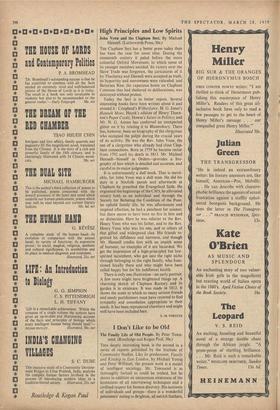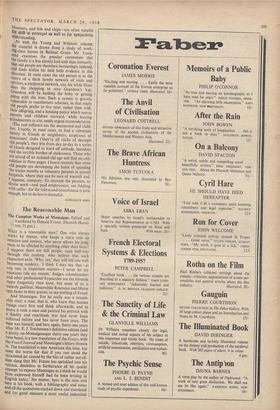I Don't Like to be Old
THIS deeply interesting book is the second in a series of reports published by the Institute of Community Studies. Like its predecessor, Family and Kinship in East London, by Michael Young and Peter Willmott, the present work is a model of intelligent sociology. Mr. Townsend is as thoroughly factual as could be wished, but he shows in addition an uncommon awareness of the limitations of all interviewing techniques and a civilised respect for human diversity. His accounts of individuals and groups—there is a wonderful pensioners' outing to Brighton, all ostrich feathers,
bloomers, and fish and chips—are often notable for skill in portrayal as well as for sympathetic understanding.
As with the Young and Willmott volume, the material is drawn from a study of work- ing-class homes in Bethnal Green. Mr. Town send examines the popular contention that the family is a less closely knit unit than formerly, that old people are therefore increasingly isolated, and finds within his field little evidence in this direction. In most cases the old person is at the centre of a thick family network of visits and services, a reciprocal network, too, for while M urn does the shopping to save Grandma's legs, Grandma will be bathing the baby or getting going with the iron. Such a system is gravely vulnerable to resettlement schemes, in that many old people prefer to live near, rather than with, their offspring, and a housing policy which moves parents and children outward, while leaving grandparents in situ, needs urgent reconsideration.
The real sufferers are the unmarried and child- less. Unable, in most cases, to find a substitute family in friends or neighbours, suspicious of pensioners' clubs ('they're all clicks of decrepit old people'), they live from day to day in a series of rituals designed to ward off solitude, boredom and the terrible burden of uselessness. Those who are afraid of an isolated old age will find no con- solation in these pages. I heard recently that some old people are developing the habit of spending the winter months as voluntary patients in mental hospitals, where they can be sure of warmth and, I suppose, company. To increase the pension, to devise work—real paid employment, not fiddling with raffia—for the infirm and housebound is little enough, but to do less is shameful.
KINGSLEY AMIS











































 Previous page
Previous page